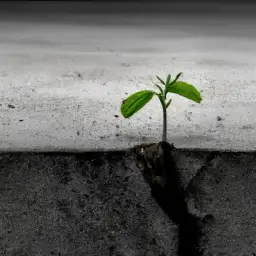Do you ever wonder why some people seem to handle adversity with ease while others crumble under pressure? The answer might just lie in their level of grit and social skills.
Cultivating these traits in everyday life can have a multitude of benefits that extend to all areas of your life.
Firstly, developing grit can lead to increased resilience. When faced with challenges or setbacks, those with grit are able to push through and continue working towards their goals. This not only helps them achieve success but also builds confidence and self-esteem.
Additionally, improving your social skills can lead to better relationships, both personally and professionally. Effective communication, active listening, and empathy are all key components of strong social skills, which can lead to improved collaboration and understanding with others.
So, whether you’re looking to improve your personal relationships or climb the career ladder, developing grit and social skills can have a significant impact on your life.
Key Takeaways
- Developing grit and social skills can lead to increased resilience and success in both personal and professional life.
- Grit and social skills can contribute to reduced stress and improved mental toughness and emotional stability.
- Possessing these traits can lead to better decision-making skills, problem-solving abilities, and effective leadership.
- Cultivating grit and social skills can have a profound impact on society by promoting unity, compassion, and progress.
Increased Resilience
By cultivating grit and social skills, you’ll be better equipped to bounce back from life’s challenges and obstacles, like a sturdy tree bending but not breaking in the face of a strong wind.
Developing perseverance is one of the key strategies in building resilience, and it involves learning how to push through difficulties and setbacks. This means developing a growth mindset, where you see challenges as opportunities for growth and learning, rather than as roadblocks.
To build resilience in children, it’s important to provide them with opportunities to develop grit and social skills. This can involve setting achievable goals and encouraging them to persist even when they face obstacles.
You can also teach them specific techniques to cope with stress and adversity, such as deep breathing or positive self-talk. By modeling resilience and perseverance yourself, and providing a supportive and nurturing environment, you can help your children develop the skills they need to thrive in the face of life’s challenges.
Improved Relationships
Developing strong interpersonal skills can enhance the quality of our relationships and lead to a more fulfilling life. Effective communication and empathy are two essential skills that can help build lasting relationships. Being able to communicate effectively means being able to express your thoughts and feelings clearly and respectfully, while empathy allows you to understand and share the feelings of others.
Another crucial aspect of strong interpersonal skills is conflict resolution. Conflict is inevitable in every relationship, but how we handle it can make all the difference. By learning conflict resolution skills, such as active listening and finding common ground, we can avoid unnecessary arguments and work towards finding solutions that benefit everyone involved.
Overall, cultivating grit and social skills, including effective communication, empathy, and conflict resolution, can greatly improve our relationships and lead to a more fulfilling life.
Increased Personal and Professional Success
You can achieve greater personal and professional success by improving your interpersonal skills and becoming a better communicator. When you have strong social skills, you can effectively collaborate with others, manage conflicts, and build trust and rapport with colleagues. This leads to more opportunities and positive relationships in all areas of your life.
Moreover, cultivating grit can also contribute to increased personal and professional success. Grit refers to perseverance and passion for long-term goals, and it can help you overcome obstacles and setbacks on your path to success. With improved productivity and enhanced leadership skills, you can achieve greater success in your career and personal life. By combining grit and social skills, you can build a strong foundation for success that will benefit you for years to come.
| Improved Productivity | Enhanced Leadership Skills |
|---|---|
| Better time management | Effective delegation |
| Clear communication | Inspiring and motivating |
| Goal-oriented mindset | Decisive and confident |
| Adaptability | Strategic thinking |
| Continuous learning | Empathetic and approachable |
This table highlights some key traits that contribute to improved productivity and enhanced leadership skills. By developing these traits, you can become a more effective and successful leader in your personal and professional life. Whether you’re managing a team at work or navigating relationships with friends and family, these skills can help you achieve your goals and build positive relationships. By focusing on both social skills and grit, you can unlock your full potential and achieve greater success in all areas of your life.
Better Health and Well-being
You can experience better health and well-being by cultivating grit and social skills in your everyday life.
One key benefit is reduced stress, which can have a major impact on your physical and mental health.
By developing resilience and coping mechanisms, you can improve your overall well-being and lead a happier, healthier life.
Reduced Stress
By cultivating grit and social skills, it’s easier to navigate through stressful situations and come out on top. Here are some ways that cultivating these traits can help reduce stress in your life:
-
You’ll be better equipped to handle unexpected challenges. When you have grit, you’re able to stay focused and persevere through difficult situations. Social skills also come in handy here, as you can rely on your network of friends and colleagues for support and advice.
-
You’ll be less reactive to stressors. Mindfulness practices can help you stay calm and centered in the face of stress, while time management techniques can help you feel more in control of your schedule. When you’re less reactive, you’re less likely to get caught up in a cycle of negative emotions and thoughts.
-
You’ll have a more positive outlook on life. When you have grit, you’re able to see setbacks as opportunities for growth and learning. Social skills also come into play here, as positive relationships can boost your mood and outlook on life.
-
You’ll be more resilient overall. By cultivating grit and social skills, you’ll be better equipped to handle stressors in all areas of your life. You’ll be able to bounce back from setbacks, stay focused on your goals, and maintain a positive outlook on life.
Improved Mental Health
Now that you know how cultivating grit and social skills can help reduce stress in your daily life, let’s talk about another important benefit: improved mental health.
By developing mental toughness and emotional stability through grit, you’ll be better equipped to handle life’s challenges and overcome obstacles that may have previously seemed insurmountable. Mental toughness is the ability to stay focused, motivated, and resilient in the face of adversity.
It’s the capacity to bounce back from setbacks and maintain a positive attitude, even when things don’t go as planned. By cultivating grit, you’ll develop the mental toughness necessary to persevere through difficult times and emerge stronger on the other side.
Additionally, emotional stability is critical for maintaining good mental health. It involves being aware of and in control of your emotions, rather than letting them control you. With social skills, you’ll be better equipped to manage your emotions and communicate effectively with others, leading to improved mental health and overall well-being.
Improved Decision Making
When cultivating grit and social skills, it’s easier to make decisions that align with your values and goals, allowing you to live a more fulfilling life. Developing grit and social skills enhances your decision-making abilities in daily life, as it helps you approach situations with a strategic mindset.
Here are a few ways that cultivating grit and social skills can improve your decision-making skills:
-
Grit helps you persevere through challenges and setbacks, allowing you to stay focused on your long-term goals. This can help you make decisions that prioritize your values and goals, rather than short-term impulses or distractions.
-
Social skills help you communicate effectively with others, allowing you to gather information and perspectives that can inform your decisions. When you can understand and empathize with others, you’re better equipped to make decisions that benefit everyone involved.
-
Cultivating grit and social skills also helps you develop self-awareness, which can help you identify your own biases and blind spots. This allows you to approach decisions with a more objective and open-minded perspective.
-
Finally, when you have grit and social skills, you’re better equipped to bounce back from failures and setbacks. This can help you approach decisions with more confidence and resilience, knowing that you have the skills to adapt and recover if things don’t go as planned.
Overall, developing grit and social skills is a powerful way to enhance your decision-making and problem-solving abilities in daily life. By cultivating these skills, you’ll be better equipped to make decisions that align with your values and goals, and navigate the challenges and opportunities that come your way.
Positive Impact on Society
Developing a strong sense of grit and effective social skills can have a profound impact on society as a whole. When individuals possess these traits, they’re more likely to engage in community-building activities and work towards societal progress. This can lead to increased cooperation, collaboration, and a greater sense of unity within a community.
Moreover, individuals with grit and social skills are more likely to become effective leaders and role models, inspiring others to take action and make positive changes in their communities. They’re also better equipped to handle challenges and setbacks, which are inevitable in any effort to create social change.
Overall, cultivating grit and social skills can lead to a more compassionate, empathetic, and engaged society. Individuals work towards a common goal of creating a better world for all.
Frequently Asked Questions
What are some practical ways to cultivate grit and social skills in everyday life?
To cultivate grit and social skills in everyday life, you can start by practicing everyday practices and real life scenarios.
Building resilience is important, so try setting small goals for yourself and pushing through obstacles to achieve them. This will help you develop perseverance and determination.
Communication skills are also crucial, so try to actively listen to others and express your thoughts and feelings clearly. Practice empathy by putting yourself in other people’s shoes and understanding their perspectives.
You can also join clubs or groups that align with your interests and values, where you can meet new people and practice social skills.
By incorporating these practices into your daily life, you can develop the grit and social skills needed to succeed in both personal and professional settings.
Can grit and social skills be developed through formal training or education programs?
If you’re wondering whether grit and social skills can be developed through formal training or education programs, the answer is yes. Formal training can help you develop specific skills related to grit and social interactions, such as communication and problem-solving.
However, it’s important to note that self-learning can also play a significant role in developing these skills. By taking the initiative to read books, attend workshops, and practice these skills in your everyday life, you can improve your grit and social skills even without formal training.
Ultimately, the key is to find a balance between formal training and self-learning, as both approaches can be effective in helping you cultivate these important skills.
How can someone measure their level of grit and social skills and track their progress over time?
If you’re wondering how you can measure your level of grit and social skills, self-assessment and goal setting are great starting points.
Start by evaluating your current level of grit and social skills, and identify areas where you can improve. From there, set specific goals for yourself and track your progress over time.
Journaling can help you reflect on your experiences and identify patterns in your behavior. Additionally, seeking feedback from others can provide valuable insights and help you identify blind spots.
By creating feedback loops and consistently tracking your progress, you can continue to develop your grit and social skills over time.
Are there any potential drawbacks or negative consequences to cultivating grit and social skills?
When it comes to cultivating grit and social skills, it’s important to be aware of potential drawbacks or negative consequences.
Developing grit can lead to a tendency to push yourself too hard, which can result in burnout or unhealthy stress levels.
Additionally, social skills can be challenging to develop, and it’s possible to experience frustration or disappointment along the way.
There is also a risk of becoming overly focused on social status or approval, which can detract from genuine connections with others.
It’s important to approach the process of building grit and social skills with realistic expectations, and to be mindful of any unintended negative effects that may arise.
What are some common misconceptions or myths about the benefits of grit and social skills?
You may have heard some common misconceptions about the benefits of cultivating grit and social skills. However, it’s important to debunk these myths.
One common misconception is that grit and social skills are only useful for achieving success in the workplace. In reality, these skills have benefits in all aspects of life, including personal relationships and mental health.
Another myth is that grit means never giving up, even in the face of failure. In truth, grit involves the ability to adjust and adapt when faced with obstacles.
Similarly, social skills are often viewed as solely related to extroversion, but introverts can also excel in this area by using active listening and empathetic communication.
By understanding and debunking these myths, you can appreciate the true value of cultivating grit and social skills in your everyday life.
Conclusion
Now that you’ve learned about the seven key benefits of cultivating grit and social skills in everyday life, it’s time to start implementing them into your daily routine.
By developing resilience, you’ll be able to handle life’s challenges with greater ease and bounce back from setbacks quicker.
By improving your relationships, you’ll create a support system that will help you through difficult times and increase your overall happiness.
Additionally, developing grit and social skills will lead to increased personal and professional success, better health and well-being, improved decision making, and a positive impact on society.
So, start practicing perseverance, learn how to communicate effectively, and don’t be afraid to step out of your comfort zone.
By doing so, you’ll reap the benefits of cultivating grit and social skills and live a more fulfilling life.














































































































